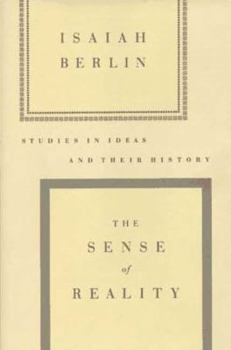Sense of Reality
Select Format
Select Condition 
Book Overview
A New York Times Notable Book of the Year Isaiah Berlin's The Sense of Reality contains an important body of previously unknown work by one of our century's leading historians of ideas, and one of the... This description may be from another edition of this product.
Format:Hardcover
Language:English
ISBN:0374260923
ISBN13:9780374260927
Release Date:May 1997
Publisher:Farrar Straus Giroux
Length:304 Pages
Weight:1.22 lbs.
Dimensions:1.1" x 6.3" x 9.3"
Customer Reviews
3 ratings
A Must Read of Any Wannabe Philosophers
Published by Thriftbooks.com User , 19 years ago
This is exactly one of the best books of Isaiah Berlin. Especially in the paper of "Philosophy & Government Repression", Berlin explained clearly in a British/Oxon point of view about those very basic, but very important questions, such as what the real subject of philosophical studies should be, what philosophy is, what kind of philosophers are the first class ones? etc. etc. A clear-headed statement for all people who interested in philosophical topics or even try to "teach" philosphy.
The Superb Study of Ideas
Published by Thriftbooks.com User , 21 years ago
I have, since first reading this book a few years ago, made an effort to add it to the libraries of all my friends whenever a holiday occurs. It is a book that I reread whenever I want to be stimulated. The opening essay, "The Sense of Reality", is a masterful study of historical thinking. Berlin is able to pick apart massive themes and shape them to his interests. There is a good reason that he has been labeled by many as one of the greatest essayists of all time; this collection certainly rivals "The Hedgehog and the Fox".
NINE POWERHOUSES OF INTELLECTUAL ELECTRICITY!
Published by Thriftbooks.com User , 25 years ago
All of Isaiah Berlin's books are good. But this one is his best."The Sense of Reality" is a collection of nine brilliant essays on "ideas and their history." Each essay is a powerhouse of intellectual electricity!In a style that is stimulating, compelling--and, in the end, irresistible--Berlin writes about ideas with all the nervous energy of an enthusiast.Yet he is clear to the end. He is a great explainer. He distinguishes one thing from another. He takes on the knots, unties them, and lets go of the rope.The effect on the reader is one of exhilarating liberation. One can breathe a little freer. At the same time, one must breathe a little harder. Up here, at high altitude, in the Sierras of the cerebellum, the air is crisp as paper. And our guide, our cicerone, our Isaiah, keeps us skipping--at a dizzying pace!--from mountaintop to mountaintop.As the pages turn, they envelop the reader in a whirlpool of words that round up the ideas--only to plunge them into a deep sea of profound thought. Once again, we gasp for air.Indeed, it seems that, wherever Berlin takes us--the mountains, seas, skies, stars of the mind--we are left dazzled, breathless, tottering on the edge of horizons that become elastic, expansive, infinite . . .In the title essay, Berlin writes of the "disturbing experience," the "electric shock," of "genuinely profound insight"--which he likens to the touching of nerves deeply embedded in our most private thoughts and basic beliefs.This is not Science. This is the Humanities. Not the mechanics of Newton. But the Pensees of Pascal. Not knowledge. But knowing that "there is too much we do not know, but dimly surmise."Very well. But what does Berlin mean by the "sense of reality"? In his essay "Political Judgement," he drops a few more clues. It is "a sense of direct acquaintance with the texture of life." Or: "natural wisdom, imaginative understanding, insight, perceptiveness, and...intuition." Or: "practical wisdom,...a sense of what will 'work' and what will not. It is a capacity...for synthesis rather than analysis, for knowledge in the sense in which trainers know their animals, or parents their children, or conductors their orchestras, as opposed to that in which chemists know the contents of their test tubes, or mathematicians know the rules that their symbols obey."Outside the sphere of science--i.e., in real life (personal and political)--the scientific method fails. But a "sense of reality" can work. Really? Why? How can that be? Perhaps it is because a "sense of reality" allows one to grope, feel, touch, grasp...the important things in life..., which slip through the fingers of science.The search for truth, or for what works, whether by scientific method, or by a "sense of reality," is one thing. But will is another. Will asserts and expresses not truth but self.According to Berlin, will manifests itself individually in Romanticism ("The Romantic Revolution"





